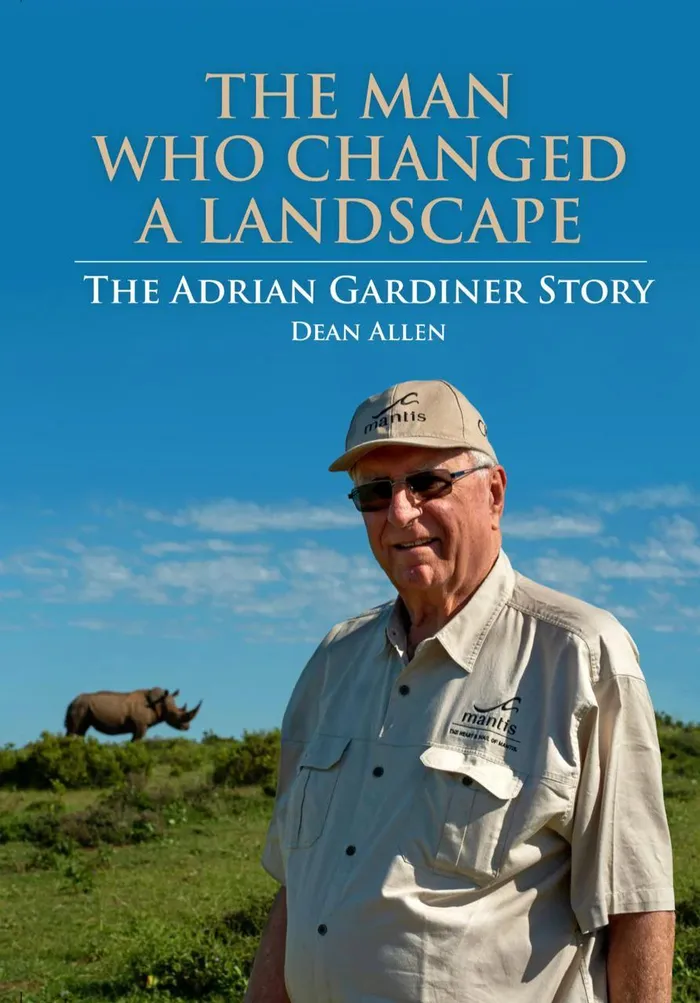Rewilding the Eastern Cape: Dean Allen chronicles the visionary who turned desolation into a wildlife paradise
BOOKS

The journey of writing the biography proved to be intricate as it was Dean Allen's first true biography focusing on a living subject.
Image: Supplied
South Africa’s Eastern Cape, once a barren landscape devoid of wildlife, is now a testament to the power of vision and perseverance, thanks to the relentless efforts of one man, Adrian Gardiner.
In the newly released biography, “The Man Who Changed a Landscape: The Adrian Gardiner Story”, best-selling author Dean Allen recounts Gardiner's extraordinary journey from humble beginnings to becoming a pioneering figure in conservation and tourism.
Two centuries ago, the Eastern Cape was a thriving habitat for elephants and diverse wildlife. By 1989, however, the land was unrecognisable - stripped of its natural bounty, overgrazed, and struggling under human impact.
In stark contrast to the prevailing narrative of desolation, Gardiner envisioned a future where nature could reclaim its rightful place.
Gardiner’s ambitious dream materialised in the form of the Shamwari Private Game Reserve, now hailed as one of the continent’s leading wildlife destinations.
Within just three years, an idea once regarded as “crazy” blossomed into a globally acclaimed reserve, which welcomed back majestic elephants, rhinos, lions, and leopards. Such a remarkable restoration of wildlife is a testament to Gardiner's vision and unwavering determination.
Beyond restoring wildlife, Gardiner's legacy includes redefining the relationship between conservation, tourism, and economic development.
His innovative approach proved that business and sustainability could thrive together rather than existing in isolation.
Through Shamwari, Gardiner created jobs and revived local communities, restoring pride and proving that economic growth can align harmoniously with ecological stewardship.
Allen's biography delves into Gardiner's transition from doubt to triumph, chronicling not only his groundbreaking contributions to the environment but also his role as a mentor in the conservation field.
His narrative is a vibrant illustration of how one person's vision can ripple outwards, reshaping mindsets and practices across a region.

In “The Man Who Changed a Landscape: The Adrian Gardiner Story”, author Dean Allen recounts Gardiner's extraordinary journey from humble beginnings to becoming a pioneering figure in conservation and tourism.
Image: Supplied
In an interview, Allen shared insights into the motivation behind this profound biography.
He recounted the moment Gardiner reached out to him, inviting him to the Eastern Cape to witness the pioneering work underway.
“Adrian called me seemingly ‘out of the blue’ to invite me to the Eastern Cape to see what was being done here,” Allen recalled.
“Only later did I realise the significance of this. He needed not only a skilled biographer but also someone who could communicate his story effectively on stages around the world and through the media.”
This request unveiled itself to be more than just the tale of a man; it encapsulated the monumental rewilding of an entire geographical area.
The journey of writing the biography proved to be intricate, as it was Allen's first true biography focusing on a living subject.
Compared to his previous works that often depicted individuals from historical perspectives, Gardiner's multi-layered life revealed complexity.
“Adrian lives his life in silos. I had to make sense of a man who is not just an entrepreneur but has varied chapters in his life, including construction and horse racing,” Allen elaborated.
It was essential to create a narrative that did justice to Gardiner's legacy as a pioneer in wildlife tourism. In doing so, Allen explored not only Gardiner's successes but also the adversity and controversy that accompanied his journey.

The journey of writing the biography proved to be intricate, as it was Dean Allen's first true biography focusing on a living subject.
Image: Supplied
Allen's process involved conducting over 70 interviews with individuals who have crossed paths with Gardiner, adding depth to the biography that could have been overlooked through solitary accounts.
“As a true ‘serial entrepreneur,’ Adrian's life story offers a nuanced perspective on what it takes to succeed - and that aspect adds unique value to the book,” he explained.
“It’s not just about Gardiner; it's a human story that resonates with anyone familiar with the challenges of innovation.”
The narrative weaves a rich tapestry of Gardiner's vision, showcasing his ability to see opportunities where many could only see obstacles.
“Back in the late 1980s, he stood in the Eastern Cape, envisioning the land's potential. His determination led to the reintroduction of species that once roamed the land before settlers arrived,” noted Allen.
At the core of Gardiner’s mantra is a profound quote: “Conservation without cash is a conversation.”
This realism is underscored by his collaborations with conservation luminaries such as Ian Player, enriching both his mission and fostering growth in private wildlife reserves like Shamwari.
Allen hopes readers leave with a crucial message from the biography: greatness is achievable through determination, vision, and teamwork.
“As an adopted South African, like Adrian, I see immense potential in our country,” he stated. “Ultimately, this book should encourage others to seize the moment and create their own legacy.”
Related Topics: